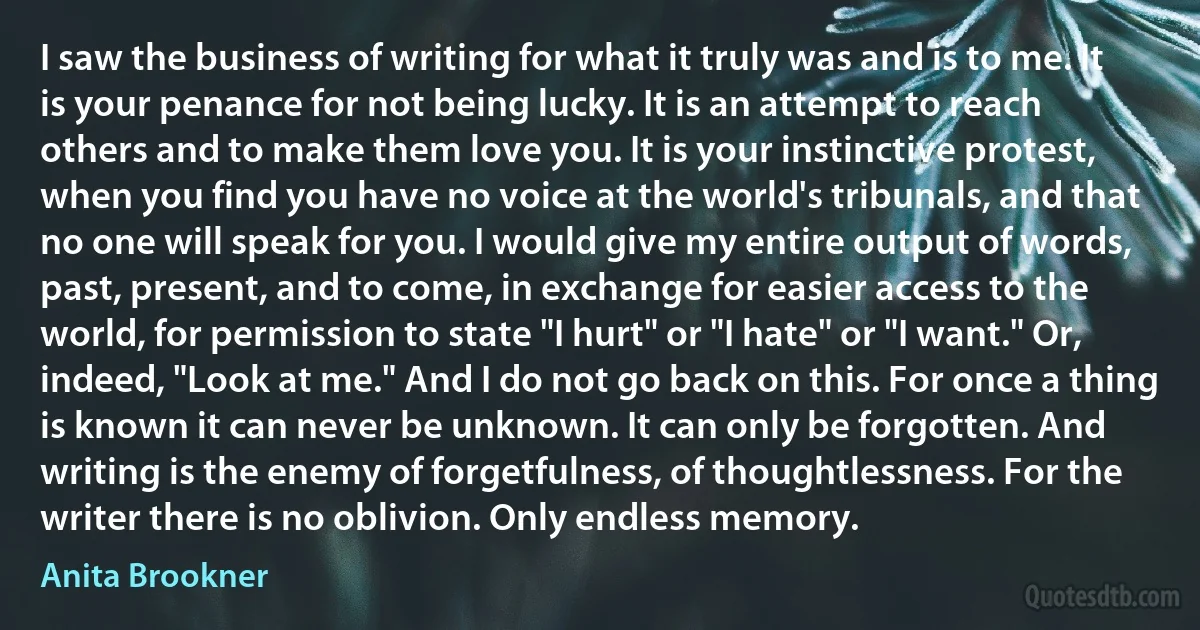
I saw the business of writing for what it truly was and is to me. It is your penance for not being lucky. It is an attempt to reach others and to make them love you. It is your instinctive protest, when you find you have no voice at the world's tribunals, and that no one will speak for you. I would give my entire output of words, past, present, and to come, in exchange for easier access to the world, for permission to state "I hurt" or "I hate" or "I want." Or, indeed, "Look at me." And I do not go back on this. For once a thing is known it can never be unknown. It can only be forgotten. And writing is the enemy of forgetfulness, of thoughtlessness. For the writer there is no oblivion. Only endless memory.
Anita BrooknerRelated topics
attempt business easy enemy entire find forgotten forgetfulness hate hurt known love lucky memory oblivion once output past present reach saw speak state thing unknown voice world thoughtlessness others wordsRelated quotes
The other conclusion is that art is the complement of science. Science as I have said is concerned wholly with relations, not with individuals. Art, on the other hand, is not only the disclosure of the individuality of the artist but also a manifestation of individuality as creative of the future, in an unprecedented response to conditions as they were in the past. Some artists in their vision of what might be, but is not, have been conscious rebels. But conscious protest and revolt is not the form which the labor of the artist in creation of the future must necessarily take. Discontent with things as they are is normally the expression of the vision of what may be and is not, art in being the manifestation of individuality is this prophetic vision.

John Dewey
2) "the a of différance also recalls that spacing is temporization, the detour and postponement by means of which intuition, perception, consummation - in a word, the relationship to the present, the reference to a present reality, to a being - are always deferred. Deferred by virtue of the very principle of difference which holds that an element functions and signifies, takes on or conveys meaning, only by referring to another past or future element in an economy of traces. This economic aspect of différance, which brings into play a certain not conscious calculation in a field of forces, is inseparable from the more narrowly semiotic aspect of différance.

Jacques Derrida
If you have weapons, take them home; if you do not have them, please do not seek to get them. We cannot solve this problem through retaliatory violence. We must meet violence with nonviolence. Remember the words of Jesus: «He who lives by the sword will perish by the sword.» We must love our white brothers, no matter what they do to us. We must make them know that we love them. Jesus still cries out in words that echo across the centuries: «Love your enemies; bless them that curse you; pray for them that despitefully use you.» This is what we must live by. We must meet hate with love. Remember, if I am stopped, this movement will not stop, because God is with the movement. Go home with this glowing faith and this radiant assurance.

Martin Luther King Jr.
You may not be her first, her last, or her only. She loved before she may love again. But if she loves you now, what else matters? She's not perfect-you aren't either, and the two of you may never be perfect together but if she can make you laugh, cause you to think twice, and admit to being human and making mistakes, hold onto her and give her the most you can. She may not be thinking about you every second of the day, but she will give you a part of her that she knows you can break-her heart. So don't hurt her, don't change her, don't analyze and don't expect more than she can give. Smile when she makes you happy, let her know when she makes you mad, and miss her when she's not there.

Bob Marley
History has a way of reducing individuals to flat, two-dimensional portraits. It is the enemy of subjectivity, which is why Stephen Dedalus called it "a nightmare from which I am trying to awake". If we think of Kierkegaard, of Nietzsche, of Hölderlin, we see them standing alone, outside of history. They are spotlighted by their intensity, and the background is all darkness. They intersect history, but are not a part of it. There is something anti-history about such men; they are not subject to time, accident and death, but their intensity is a protest against it. I have elsewhere called such men "Outsiders" because they attempt to stand outside history. which defines humanity on terms of limitation, not of possibility.

Colin Wilson
